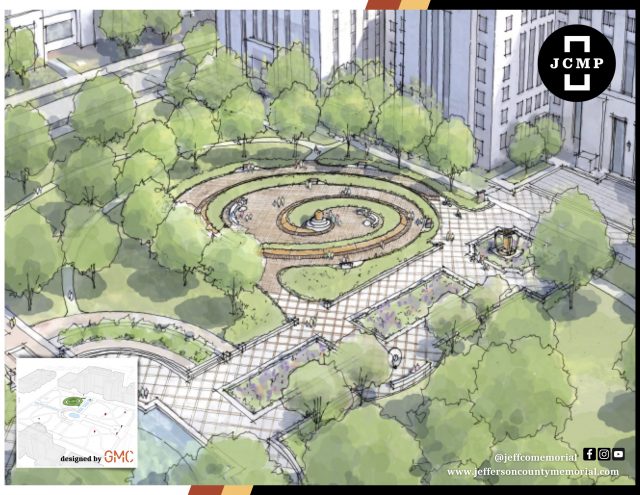By Ryan Michaels
The Birmingham Times
An official design for a monument honoring victims of racial terror violence was unveiled by the Jefferson County Memorial Project (JCMP) on Tuesday before Birmingham City Council.
The monument will stand inside Charles Linn Park, which itself rests between Birmingham City Hall and the Jefferson County Courthouse downtown.
A groundbreaking for the monument is expected in 2026.
Gina Mallisham, director of the JCMP, said Linn Park was chosen as the site for the monument for a number of reasons, most notably, Jefferson County’s first documented lynching took place in 1883 in the park, when a white mob killed Lewis Houston.
Additionally, the park served as a route for Black residents seeking to fight against the poll tax, particularly in the 1930s. Linn Park also sit between City Hall and the downtown County Courthouse, and “entities that surround [the park at the time] are the ones that allowed for these lynchings to happen,” Mallisham said.
The design of the monument features a spiral chronicling the personal stories of the county’s 33 documented lynchings, alongside a timeline of racial injustice, liberation and continued struggle. The timeline will feature the periods of slavery, civil war, reconstruction, Jim Crow laws, civil rights and mass incarceration.
At the center of the “Reconciliation Spiral” will be the Jefferson County Memory Jar, a mason jar-shaped memorial, which will be decorated by African Adinkra symbols for each of the lynching victims.
Memory jars were a common practice among African Americans who had lost loved ones, according to the JCMP, and the idea was brought to the United States by slaves.
Originally from Ghana, Adinkra are symbols used to represent concepts and words of wisdom, used both for decorative and meaningful purposes.
In addition to the spiral monument, the JCMP also announced on Tuesday that they would be paying to make a steel pillar, fashioned after the ones at the National Memorial for Peace and Justice in Montgomery which nod to the counties where documented lynchings occurred in the United States, to be placed in front of the Jefferson County Courthouse, within the park.
Mallisham said it was special to her that the steel pillar will be overlooked by the seventh-floor room where Rev. Dr. Martin Luther King Jr. was last incarcerated in what is now the Jefferson County Courthouse. “It’ll all come together in one space, which is, I think, very valuable,” Mallisham said.
She also pointed to one area of the monument stands out for her: a round, metal piece that is polished to shine on one of its sides. The piece, which honors Houston, is reflective, she said.
“This is meant to mirror every visitor, with the reminder that each of us is responsible for ending the violence and ending racism and reforming our systems to change and make life better for everybody and restore human rights.”
Anyone who donates $1,000 or more to the JCMP can have their, or a name of their choosing, “tastefully acknowledged” along the brick path of the monument, according to the JCMP.
For more information, visit https://jeffersoncountymemorial.com.
The JCMP was created in 2018 in response to the Equal Justice Initiative (EJI), which in that year opened both the National Memorial for Peace and Justice (NMPJ) and the Legacy Museum, located in Montgomery, to honor lynching victims and the history of racial injustice in the United States.
City Councilor Carol Clarke, who served as volunteer chair of the design committee for memorial space in the city that includes JCMP, said the EJI helped influence Jefferson County. “As you exited the [EJI] memorial, you would walk through this kind of graveyard of duplicate pillars, and there was a call to action for each county to go back and do this local reckoning, this community remembrance work, in coordination with EJI, with the ultimate goal of claiming the duplicate pillar for placement in a prominent location in each county. So here we are … to share with this council an approved concept for the central memorial in Jefferson County that will remember our county’s victims of racial terror lynching.”





